Recombinant Canine IL1R2 Protein, hFc-tagged
| Cat.No. : | IL1R2-170C |
| Product Overview : | Recombinant Canine IL1R2 Protein(E2RKW1) (Met1-Glu343) was expressed in HEK293 with the Fc region of human IgG1 at the C-terminus. |
- Specification
- Gene Information
- Related Products
- Case Study
- Application
- Download
| Species : | Canine |
| Source : | HEK293 |
| Tag : | Fc |
| Protein Length : | 1-343 a.a. |
| Form : | Lyophilized from sterile PBS, pH 7.4. Normally 5 % - 8 % trehalose, mannitol and 0.01% Tween80 are added as protectants before lyophilization. |
| Bio-activity : | Measured by its binding ability in a functional ELISA. Immobilized Canine IL1R2-Fc3 at 10 μg/ml (100 μl/well) can bind biotinylated human IL1B-His, The EC50 of biotinylated human IL1B-His is 0.08-0.2 μg/ml. |
| Molecular Mass : | The recombinant canine IL1R2/Fc is a disulfide-linked homodimer. The reduced monomer comprises 571 amino acids and has a predicted molecular mass of 64.8 kDa. The apparent molecular mass of the protein is approximately 65-70 kDa in SDS-PAGE under reducing conditions. |
| Endotoxin : | < 1.0 EU per ug of the protein as determined by the LAL method |
| Purity : | > 90 % as determined by SDS-PAGE |
| Storage : | Samples are stable for up to twelve months from date of receipt at -20°C to -80°C. Store it under sterile conditions at -20°C to -80°C. It is recommended that the protein be aliquoted for optimal storage. Avoid repeated freeze-thaw cycles. |
| Reconstitution : | It is recommended that sterile water be added to the vial to prepare a stock solution of 0.2 ug/ul. Centrifuge the vial at 4°C before opening to recover the entire contents. |
| ◆ Recombinant Proteins | ||
| Il1r2-8737R | Recombinant Rat Il1r2, Fc tagged | +Inquiry |
| IL1R2-121H | Active Recombinant Human IL1R2, HIgG1 Fc-tagged | +Inquiry |
| Il1r2-5702M | Recombinant Mouse Il1r2 Protein (Phe14-Glu355), C-Fc tagged | +Inquiry |
| IL1R2-2178C | Active Recombinant Canine IL1R2 protein, hFc-tagged | +Inquiry |
| IL1R2-2061R | Recombinant Rhesus Macaque IL1R2 Protein, His (Fc)-Avi-tagged | +Inquiry |
| ◆ Cell & Tissue Lysates | ||
| IL1R2-1302RCL | Recombinant Rat IL1R2 cell lysate | +Inquiry |
| IL1R2-1376MCL | Recombinant Mouse IL1R2 cell lysate | +Inquiry |
| IL1R2-834CCL | Recombinant Canine IL1R2 cell lysate | +Inquiry |
| IL1R2-1108HCL | Recombinant Human IL1R2 cell lysate | +Inquiry |
| IL1R2-1227CCL | Recombinant Cynomolgus IL1R2 cell lysate | +Inquiry |
Case 1: Wang C, et al. J Pancreatol. 2024
This study focuses on pancreatic cancer, emphasizing the urgent need for robust prognostic signatures and novel biomarkers to improve patient stratification and clinical decision-making. By employing bioinformatic analyses on public datasets, researchers constructed and validated an immune-related prognostic signature, highlighting interleukin 1 receptor type II (IL1R2) as a key gene. IL1R2 knockdown was shown to significantly impede pancreatic cancer cell proliferation, invasion, and migration. Furthermore, elevated IL1R2 expression correlated with decreased CD8+ T cell infiltration, potentially due to increased PD-L1 expression in cancer cells. The immunophenoscore (IPS) algorithm indicated that patients with high IL1R2 expression have a higher tumor mutation burden and are more likely to benefit from immunotherapy.
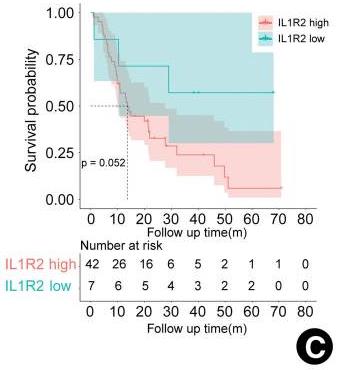
Fig1. Kaplan-Meier analysis of OS between the high IL1R2 expression group and low IL1R2 expression group.
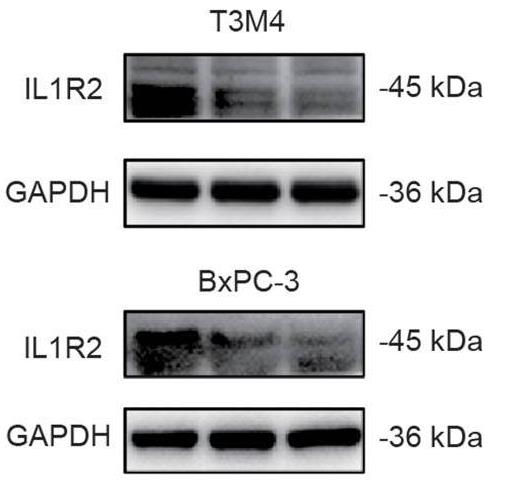
Fig2. Validation of IL1R2 knockdown efficiency in T3M4 cells and BxPC-3 cells.
Case 2: Lin J, et al. Cell Death Dis. 2022
Myocardial ischemia reperfusion (I/R) injury, characterized by inflammation and cardiomyocyte death, is a critical issue in cardiac health. The role of Interleukin-1 receptor type 2 (IL-1R2), a decoy receptor for IL-1β, in I/R injury has been unclear. This study discovered elevated serum IL-1R2 levels in patients with acute myocardial infarction (AMI) post-intervention and increased IL-1R2 expression in wild-type mice hearts after I/R surgery. IL-1R2-deficient mice exhibited larger infarcts, greater cardiomyocyte apoptosis, and reduced cardiac function. Neonatal rat ventricular myocytes (NRVM) increased IL-1R2 expression following hypoxia and reoxygenation (H/R), which was NF-κB dependent. IL-1R2 deficiency also led to increased immune cell infiltration post-surgery, correlating with cardiac damage. Overexpression of IL-1R2 in cardiomyocytes protected against apoptosis by reducing IL-17RA expression, both in vivo and in vitro.
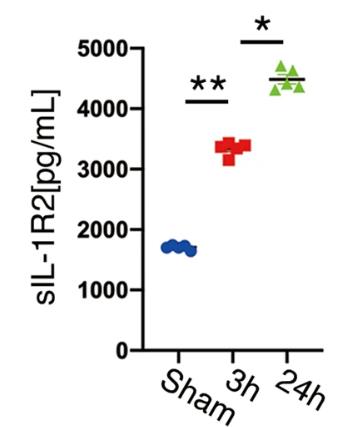
Fig1. sIL-1R2 protein levels in mice with sham surgery, 3 h and 24 h of reperfusion in I/R surgery.
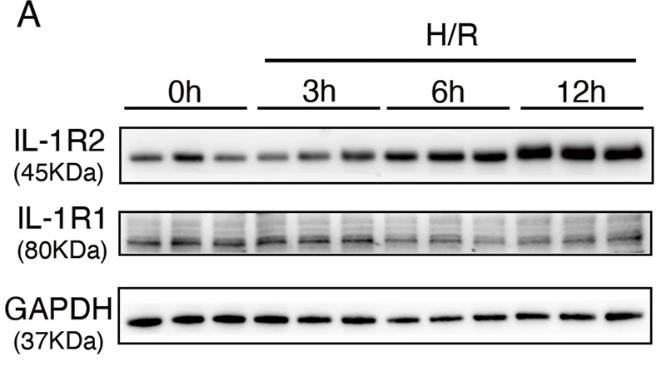
Fig2. Representative western blots of IL-1R2 and IL-1R1 in NRVM.
Recombinant Canine IL1R2 protein has important application value in the fields of scientific research and biotechnology. As a key receptor for regulating immune responses, IL1R2 plays an important role in the study of its mechanism of action, especially in inflammatory diseases and autoimmune diseases. It affects the inflammatory process by regulating the signal transduction of the IL-1 family. Therefore, the study of IL1R2 helps to deeply understand the complexity of immune regulation and inflammatory response. In drug development, recombinant IL1R2 protein can be used to screen small molecule drugs or biologics that can regulate its activity, providing new strategies for the treatment of related diseases. In addition, it also plays an important role in the development of diagnostic tools, helping to monitor disease progression and evaluate treatment effects. In animal model studies, recombinant IL1R2 protein helps to establish and study canine disease models and further explore its role in diseases. In summary, the application range of recombinant Canine IL1R2 protein is wide, from basic scientific research to clinical applications, showing its potential and importance in the study of immunology and inflammation-related diseases.
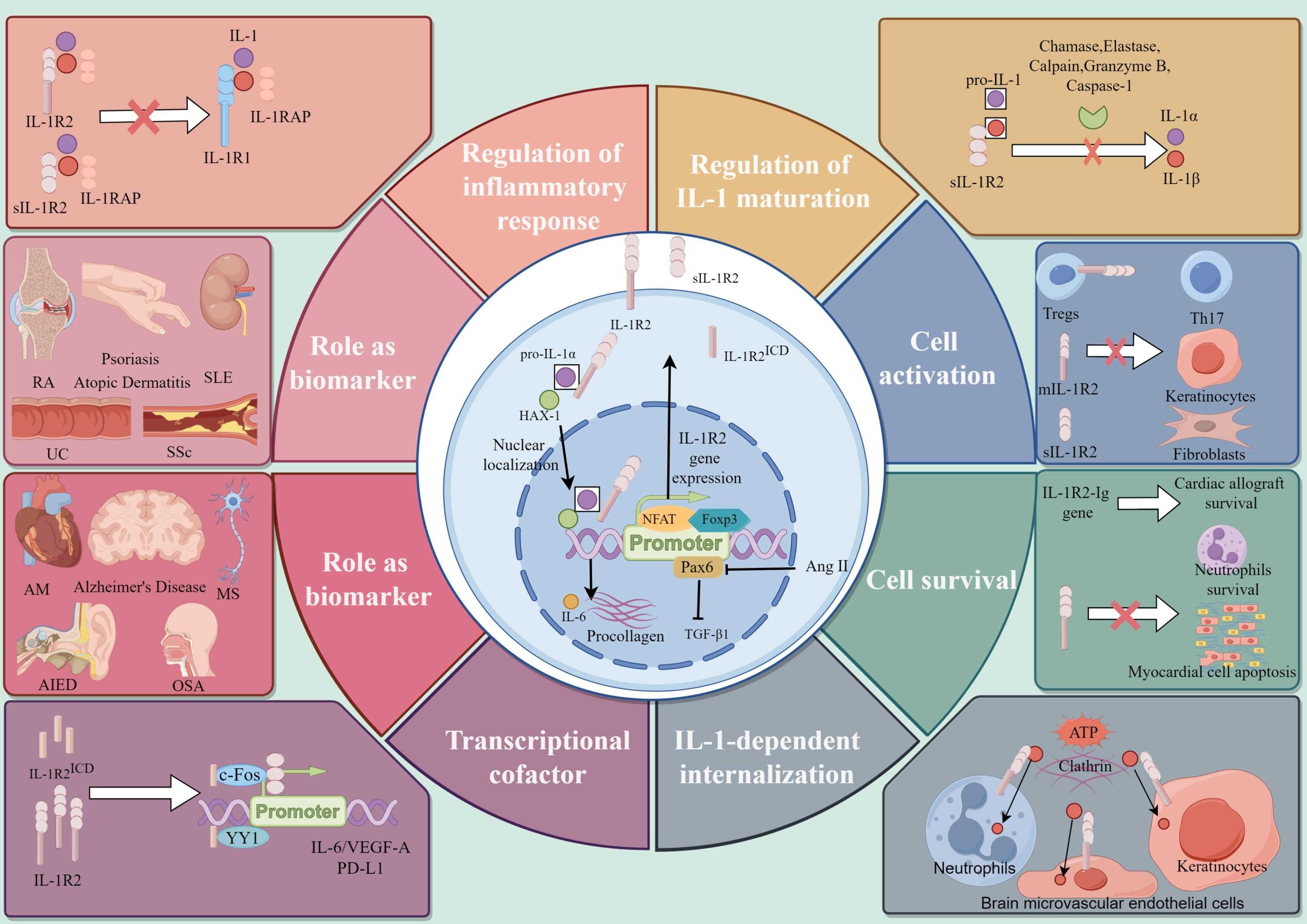
Fig1. Pathophysiological roles of IL-1R2. (Ying Zhang, 2024)
Not For Human Consumption!
Inquiry
- Reviews (0)
- Q&As (0)
Ask a Question for All IL1R2 Products
Required fields are marked with *
My Review for All IL1R2 Products
Required fields are marked with *



